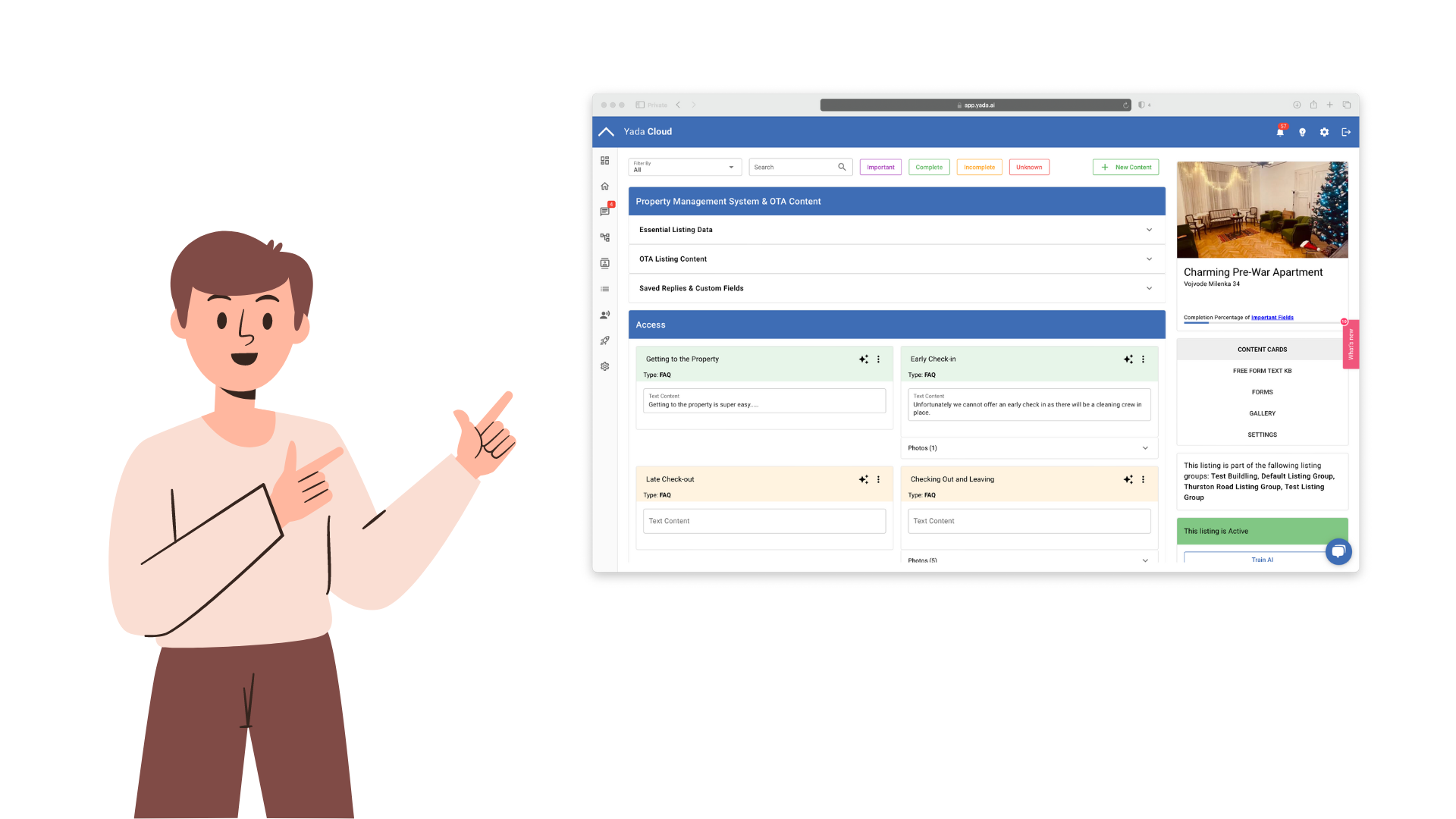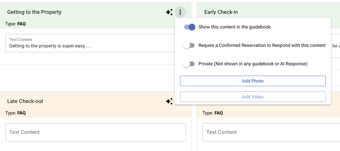We lunched yada around a year ago - April of 2023 to be exact. Since then we've seen amazing growth both in our product and in our adoption, but one thing always stood out to our team. Content management and knowledge management in AirBnBs and short term rentals was outdated, lacking, unintuitive, and fundamentally incomplete.
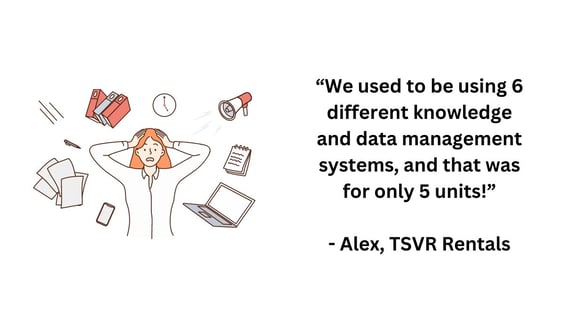
Most property managers have a stack that includes multiple OTA's and marketplaces, a Property Management System (PMS) to manage calendars, inboxes, revenue, and reporting, and a combination of physical notes, Google Drive, Notion, or Coda for their knowledge management. Agents, operators, and owners were frequently confused about where knowledge lived, what the single source of truth was, and how to find Standard Operating Procedures, guest communications templates, and private internal data.
There is another problem with this model. Short term rentals are notoriously different. Unlike hotels, each unit, house, apartment, and location has its own Quirks and Features. This means that the best guest experiences involve guidebooks and interactive guest content. Which leads to another place where property managers and hosts need to store, categorize, and update data.
Faced with these realities, and the tangential but equally important mission of creating Explainable AI (read more), we decided to completely rethink the way property managers, short term rental operators, and AirBnB hosts collect, store, and syndicate their listing data.'
And so, we rebuilt listings from the ground up
Our old listings (and listings pretty much everywhere else for that matter) were chaotic and hard to maintain. Too many sections and fields not talking to each other. Too many questions about where data lived, and too many difficulties in moving information out of the listings and into our other product like the chatbot, guidebooks, smart search, and the chat widget. Simply put, it looked something like this.
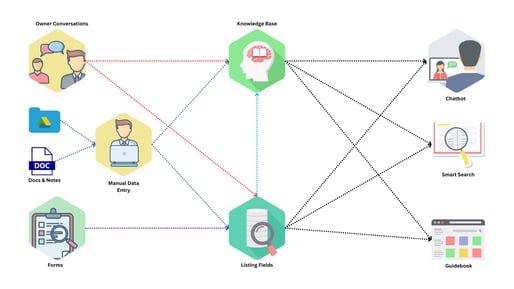
Pretty hectic? We thought so too.
👀 In a nutshell, here's what we did on Listings
When rebuilding our listings and our content management system, we wanted to drastically improve every aspect of a listing. First, we wanted to make content management and data management much easier. This means better ways of ingesting data, and making it easier for everyone on the team to get information into yada. We also wanted to make it much easier to sort, search, update, and understand the content you have. We wanted to make it so you only have to deal with one data source, and that everything coming out of it is automated - like guidebooks, chatbot answer, chat widget suggested replies, and internal search. And, critically, we wanted to build explainable AI - definitely the first such system in hospitality and one of the first production grade explainable AI
😌 Streamlined Content Management
Yada Listings V2 streamline content management from start to finish. Gone are the days of multiple content sources. Gone are the days of old spreadsheets, combined with fields in yada, combined with knowledge bases, working alongside google docs or notion.
All of this has been replaced with a unified content and knowledge management hub. Many sources going into one place being automatically spread out to many destinations. Content Cards can be filled by agents, users, and anyone on the team through the yada portal or through sharable and sendable forms. Yada will automatically ingest data from all sorts of sources like docs, notion templates, and existing guidebooks and sort them into content cards. Yad can then send all this information out to autogenerated smart guidebooks, chatbot answers, agent suggested replies, and the direct booking site chat widget. Many sources, One Home, Many Destinations.
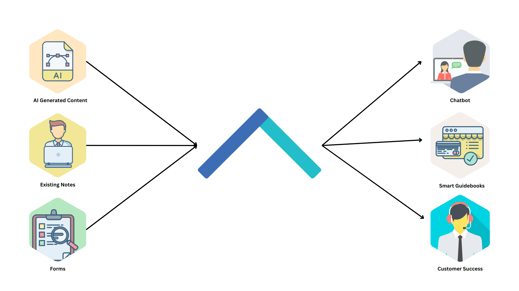
💾 New Content Cards
- Consolidated all data sources in yada into one. All our previously separate fields and sections for PMS content, amenities, FAQ's and custom fields have been merged into one type of content card that contains everything about that topic.
- Each content card contains text, images, and videos, about that particular topic. Each content card also has settings for privacy, visibility in guidebook, and whether the content is available before a check in - for information which should only be sent to the guest once they have confirmed a reservation and have checked in.
- Content cards are now grouped by topic. These topics include things like Access (Checking in & getting inside), Connectivity (Internet), Entertainment, Laundry, Local Recommendations, and many more.
- Content cards can be filtered by their completion.
- Complete - Meaning there's text content, video content, or photo content in the card.
- Incomplete - There's no content in the card
- Unknown - If it's an amenity and we don't know for sure whether it exists or not in your rental, the card is marked as incomplete
- Content cards can be filtered by their importance.
- Because we process almost 50,000 messages every single day, we know what topics guests are most likely to ask about. Important cards let you quickly see what content you need to add or provide to get to full coverage.
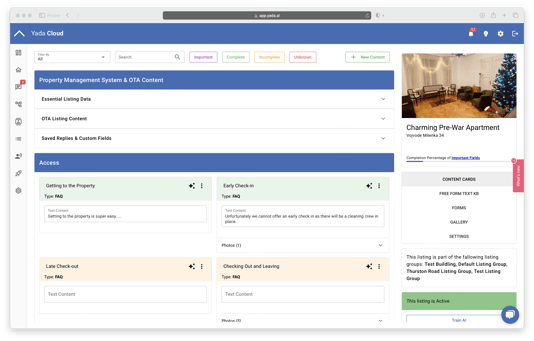
✨ Most Cards can be auto-populated by AI
The majority of default cards can generate content using AI - we generate this content from local information sources (search, yelp, events, etc.), or from your existing data like conversations, messages, and websites. Filling in listing content can be time consuming - this aims to speed that process up as much as possible.
📖 Listings auto-generate guidebooks
Hello smart guidebooks! Up until now, most property managers or hosts that had guidebooks had to use a bunch of different services to manage and syndicate that content. From hosted guidebooks to canva templates to PDF guidebooks, we've seen it all. What's the biggest problem with these? They live completely independently from your listings on AirBnB or on the property management system.
We've made it so that all your listing content cards get immediately turned into guidebook articles, and each listing comes with a default guidebook. No setup. No additional steps. Just one link that you can send out to your guests, include in scheduled messages, or automatically sent out using our buy time module.
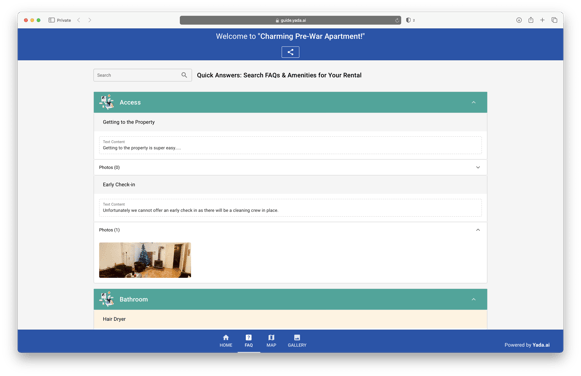
Smart Guidebooks also track views - so you know exactly how many people are engaging with your content and when. And most importantly, be able to see what content your guests are engaging with the most, and where there might be gaps in your content.
Smart Guidebooks now function as a powerful contact info collection product as well - you can hide certain fields behind a contact info collection form, so you always get the most direct way to get in touch with your guests whenever they stay with you, and turn an OTA booking into a direct booking in the future.
🤓 Explainable AI
This is a big one. Generative AI has been an instrumental tool in building more conversational interfaces and making it easy for companies without a ton of structured data and millions of example phrases to build compelling and useful chatbots. However, these new technologies come with a couple of really big problems. Namely, it is generally very hard to tell which parts of your dataset the AI using to generate responses, and how confident the AI is in the accuracy of these responses.
We've been hard at work building the industries first Explainable AI - meaning that each and every AI response can now tell you exactly where in your listing content the response is coming from and how certain it is in this response.
We'll be going into a lot more detail about each of these features and capabilities in future blog posts. Happy Hosting!



